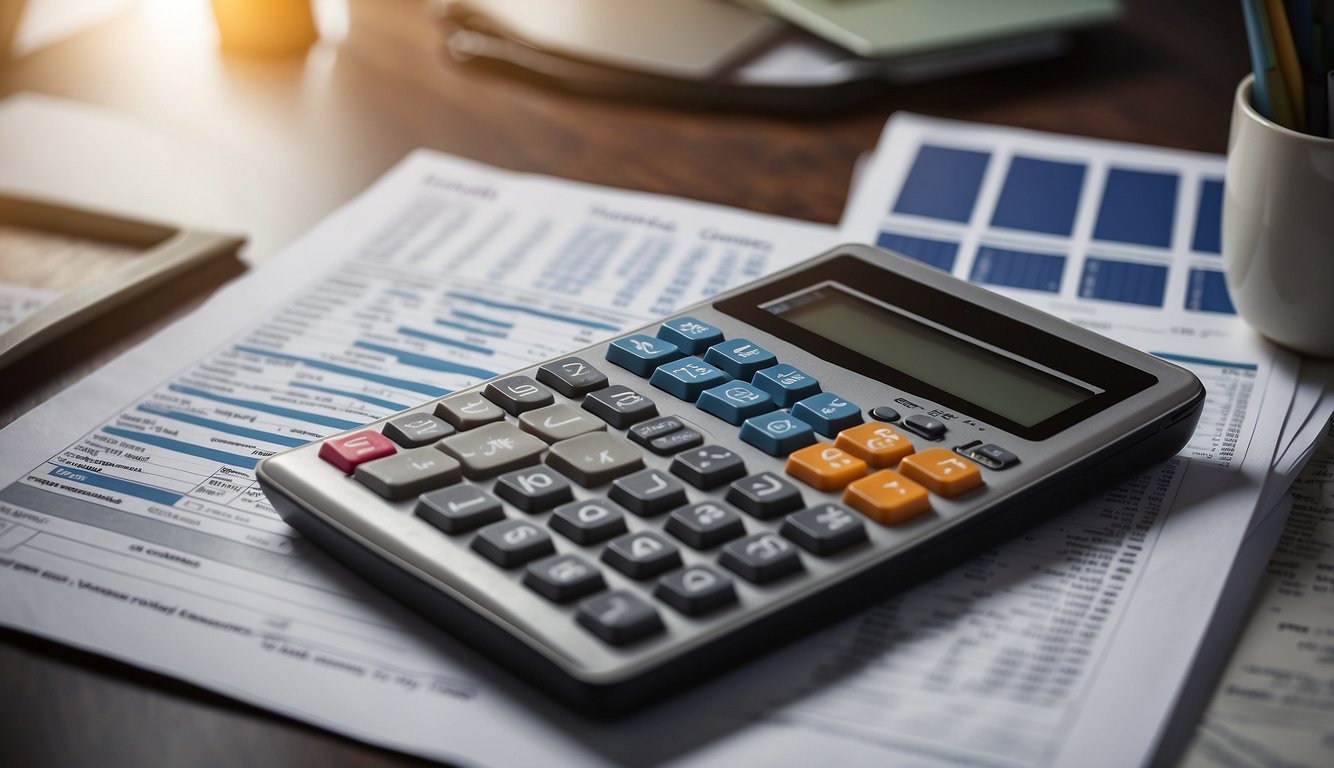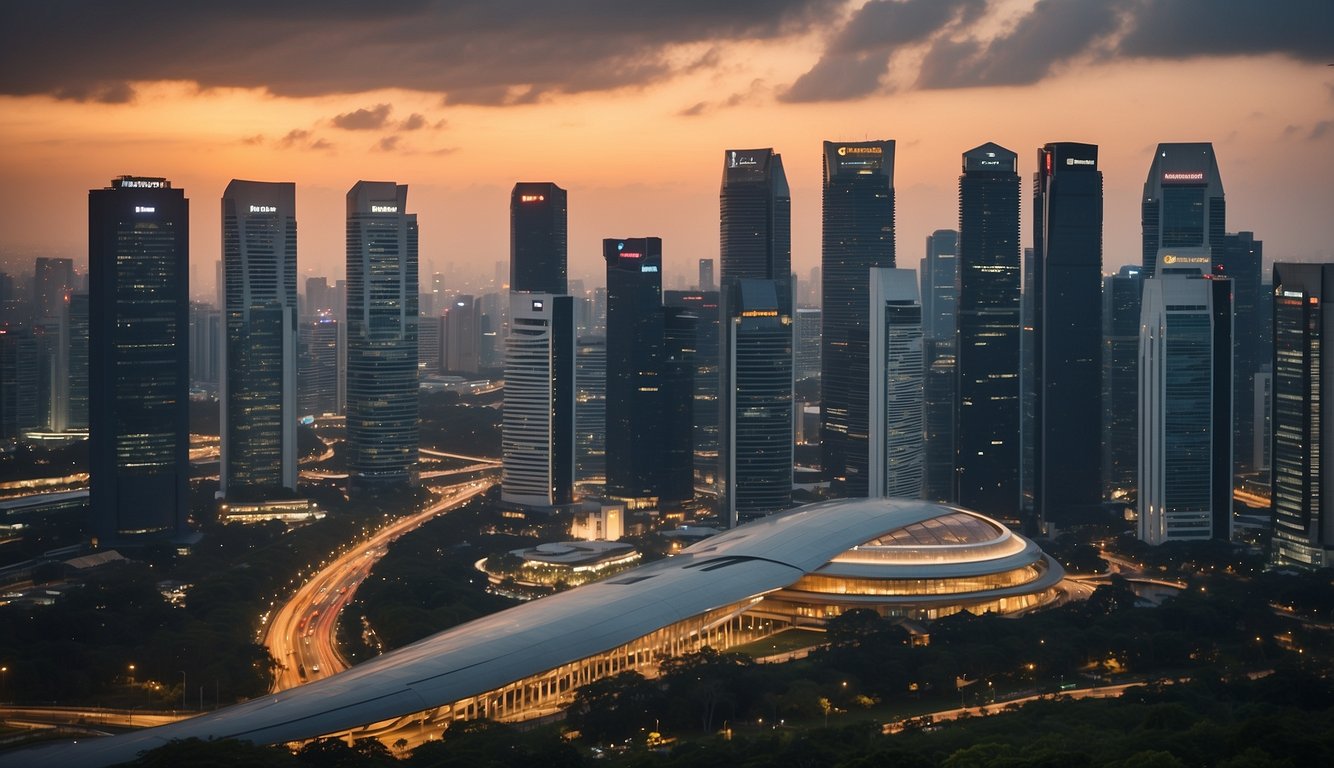
Calculating the rising cost of living in Singapore can be a daunting task, especially for those who are new to the country. Singapore is known for its high standard of living and is consistently ranked among the world’s most expensive cities.
The cost of living in Singapore has been rising steadily over the years, and it is vital to keep track of these changes to ensure you are financially prepared.
Understanding the Cost of Living in Singapore is the first step in calculating the rising cost of living. The cost of living refers to the amount of money needed to sustain a certain standard of living in a particular place. In Singapore, the cost of living is influenced by various factors such as housing, food, transportation, and healthcare. It is important to note that the cost of living can vary depending on one’s lifestyle and personal choices.
Key Takeaways:
- Understanding the cost of living is crucial in calculating the rising cost of living in Singapore.
- The cost of living in Singapore is influenced by various factors such as housing, food, transportation, and healthcare.
- The cost of living can vary depending on one’s lifestyle and personal choices.
Understanding the Cost of Living

If you are living in Singapore, you are no stranger to the rising cost of living. Understanding the factors that contribute to this increase can help you better manage your finances and plan for the future. In this section, we will take a closer look at the components of the Consumer Price Index (CPI), inflation and its measurement, and Singapore’s unique economic landscape.
Components of the Consumer Price Index (CPI)
The CPI is a measure of the average change in prices over time of goods and services consumed by households. It is made up of eight major categories, including food, housing, transportation, and healthcare. The weights of these categories are based on the average expenditure patterns of households in Singapore. By tracking the CPI, we can get a sense of how much the cost of living is increasing or decreasing.
Inflation and Its Measurement
Inflation refers to the rate at which the general level of prices for goods and services is rising. In Singapore, inflation is measured by the CPI. There are two types of inflation: headline inflation and core inflation. Headline inflation includes all items in the CPI basket, while core inflation excludes the costs of accommodation and private road transport. This is because these costs are affected by government policies and can be volatile.
Singapore’s Unique Economic Landscape
Singapore’s economy is unique in many ways. For one, it is a small, open economy that is heavily dependent on international trade. This means that external factors, such as changes in global commodity prices and exchange rates, can have a big impact on the cost of living in Singapore. Additionally, Singapore has a high level of government intervention in the economy, which can help to stabilise prices but can also lead to unintended consequences.
By understanding the components of the CPI, inflation and its measurement, and Singapore’s unique economic landscape, you can gain a better understanding of the factors that contribute to the rising cost of living in Singapore. Armed with this knowledge, you can make informed decisions about your finances and plan for the future.
Key Drivers of Inflation in Singapore

If you are wondering why the cost of living in Singapore keeps rising, there are several factors that contribute to inflation. Understanding these factors can help you better manage your finances and plan for the future.
Import Dependence and Global Supply Chains
As a small island nation with limited natural resources, Singapore relies heavily on imports to meet its needs. This dependence on imported goods and services means that any disruptions to global supply chains can have a significant impact on prices in Singapore.
For example, the COVID-19 pandemic caused widespread disruptions to global supply chains, leading to shortages of certain goods and driving up prices. Similarly, the ongoing war in Ukraine has led to disruptions in the global energy market, which has driven up the cost of oil and gas in Singapore.
The Impact of Global Events
In addition to supply chain disruptions, other global events can also impact the cost of living in Singapore. For example, changes in the global economy can affect the demand for Singaporean exports, which can, in turn, influence the country’s overall economic growth and inflation.
Climate change is another global event that can have an impact on prices in Singapore. As extreme weather events become more frequent and severe, they can disrupt supply chains and lead to shortages of certain goods, which can drive up prices.
Domestic Factors Influencing Prices
While global events and supply chain disruptions can have a significant impact on prices in Singapore, there are also domestic factors that can influence inflation. For example, changes in government policies, such as tax increases or subsidies, can impact the cost of living.
Similarly, changes in the labour market, such as shortages of skilled workers, can lead to higher wages and, ultimately, higher prices for goods and services.
Overall, understanding the key drivers of inflation in Singapore can help you better plan for the future and manage your finances. By staying informed about global events and domestic factors that can impact prices, you can make more informed decisions about your spending and saving habits.
Analysing the Housing Market

If you’re living in Singapore, you’ll know that housing is a significant expense. In this section, we’ll analyse the housing market to give you an idea of the current trends in property prices, the cost of accommodation, and mortgage and housing affordability.
Trends in Property Prices
According to a Reuters article, Singapore’s property prices have been soaring, bucking the global slump. The article suggests that rich overseas arrivals are being blamed for the rising cost of living. The Bloomberg article also reports that private home values climbed 3.2% from the previous quarter, indicating that Singapore’s housing market is on a roll.
The Cost of Accommodation
The cost of accommodation in Singapore is high, and it’s not just because of rising property prices. The Straits Times reports that inflation is not the only challenge Singapore is facing, and the country must press on with economic reform because of structural changes in the economy. As a result, the cost of living in Singapore has been rising, and accommodation is a significant contributor to that.
Mortgage and Housing Affordability
If you’re planning to buy a property in Singapore, you’ll need to consider the cost of a mortgage. The Diplomat reports that the resale price index for HDB flats increased by 12.7% in 2021, while the URA said similar surges in private residential prices. While Singapore’s property market is booming, it’s important to remember that property prices are high, and it may be challenging to afford a mortgage.
To summarise, Singapore’s housing market is booming, but the cost of accommodation is high, and it’s not just because of rising property prices. If you’re planning to buy a property in Singapore, you’ll need to consider the cost of a mortgage and whether you can afford it.
Daily Living Expenses in Singapore

Living in Singapore can be expensive, but with the right knowledge, you can plan and budget accordingly. Here’s a breakdown of some of the daily living expenses you can expect to encounter in Singapore.
Food and Nutrition Costs
Food prices in Singapore can vary depending on where you shop and what you buy. Eating out at restaurants and hawker centres can be affordable, with prices ranging from £3 to £10 per meal. However, if you prefer to cook at home, you can expect to spend around £200 to £300 per month on groceries.
To save money on food, you can consider buying in bulk, shopping at wet markets, and taking advantage of promotions and discounts. Additionally, incorporating more plant-based meals into your diet can also help you save money on groceries.
Transport and Commuting Charges
Singapore has an efficient public transportation system that includes buses, trains, and taxis. The cost of public transportation is relatively affordable, with a single bus or train ride costing around £0.70 to £2.00.
If you prefer to drive, you can expect to spend around £1,000 to £1,500 per month on car-related expenses, including petrol, parking, and insurance. However, owning a car in Singapore is not necessary, as public transportation is reliable and affordable.
Healthcare and Education Fees
Singapore has a comprehensive healthcare system, with both public and private healthcare options available. The government provides subsidies for healthcare costs, and citizens and permanent residents are automatically enrolled in MediShield Life, a national health insurance scheme.
Education in Singapore is also highly regarded, with both public and private schools available. Public schools are subsidized by the government, with primary and secondary education being compulsory for all children.
Overall, living in Singapore can be expensive, but with proper planning and budgeting, you can manage your daily living expenses.
Comparing Costs Across Different Income Levels

When it comes to calculating the rising cost of living in Singapore, it is important to take into consideration the different income levels. The challenges faced by those in the low-range income bracket are vastly different from those in the high-range income bracket. Here’s a breakdown of the different challenges faced by each income level:
Low-Range Income Challenges
If you fall under the low-range income bracket, you may find it challenging to make ends meet. With the rising cost of living in Singapore, you may struggle to cover your basic needs, such as housing, food, and healthcare. According to Loan Advisor, renting a home in Singapore can cost between $600 and $800 a month. This can be a significant expense for those in the low-range income bracket.
Mid-Range Income Expenditures
If you fall under the mid-range income bracket, you may find that your monthly expenses are higher than those in the low-range income bracket. You may have more disposable income, but you also have more expenses to cover. According to Smart Wealth, the estimated monthly cost of living in Singapore is $2,560. This includes expenses such as housing, food, transportation, and healthcare.
High-Range Income Lifestyle
If you fall under the high-range income bracket, you may find that your lifestyle expenses are much higher than those in the low or mid-range income brackets. You may have more disposable income to spend on luxury items such as expensive cars, fine dining, and travel. However, you may also have higher expenses, such as mortgage payments for a luxury home. According to Smart Wealth, the prices of HDB resale flats have increased by 116% since 2000.
In conclusion, calculating the rising cost of living in Singapore depends on your income level. Those in the low-range income bracket face different challenges than those in the high-range income bracket. It is important to take into consideration your income level and monthly expenses when calculating the rising cost of living in Singapore.
Government Measures and Public Support

If you’re living in Singapore, the government has implemented several measures to help you cope with the rising cost of living. Here are some of the measures that you might find helpful:
Subsidies and Vouchers
The government has introduced several subsidies and vouchers to help Singaporeans manage their daily expenses. For example, the Community Development Council Vouchers scheme provides eligible households with vouchers that can be used to purchase daily necessities such as food and household items. Additionally, the government has implemented various systems to provide subsidies for healthcare, education, and public transport.
Cash Transfers and Social Assistance
In addition to subsidies and vouchers, the government has also implemented cash transfer schemes to help Singaporeans cope with the rising cost of living. For example, the GST Voucher scheme provides cash payouts to eligible Singaporeans to help offset the impact of the Goods and Services Tax (GST) on their daily expenses. The government has also introduced various social assistance schemes to provide financial support to low-income households.
Tax Policies and Rebates
The government has implemented various tax policies and rebates to help Singaporeans manage their expenses. For example, the government has introduced tax rebates for personal income tax, property tax, and corporate income tax. Additionally, the government has implemented various measures to reduce the tax burden on low-income households.
Overall, the government has been proactive in implementing measures to help Singaporeans manage the rising cost of living. These measures include subsidies, vouchers, cash transfers, social assistance, tax policies, and rebates. By taking advantage of these measures, you can better manage your daily expenses and maintain your standard of living.
The Future of Living Costs

As Singapore continues to grow and develop, it’s essential to consider the future of living costs. Economists predict that the cost of living in Singapore will continue to rise in the coming years. However, there are structural changes and adaptations that can be made to help alleviate some of these costs and prepare for long-term sustainability.
Predictions by Economists
According to the Economist Intelligence Unit, Singapore’s cost of living is expected to continue to rise in the coming years due to factors such as inflation and a growing labour market. While this may seem daunting, there are steps that can be taken to help mitigate these costs.
Structural Changes and Adaptations
One way to help address the rising cost of living in Singapore is to implement structural changes and adaptations. This could include investing in new technologies to improve efficiency and reduce costs, as well as promoting sustainable practices to help reduce waste and conserve resources.
Another critical factor to consider is the labour market. By investing in education and training programs, Singapore can help prepare its workforce for the jobs of the future, and ensure that they have the skills and knowledge needed to succeed.
Preparing for Long-Term Sustainability
To ensure long-term sustainability, it’s important to focus on price stability and avoid economic recession. This can be achieved through policies that encourage investment and growth while also maintaining a stable and predictable business environment.
Overall, while the future of living costs in Singapore may seem uncertain, there are steps that can be taken to help prepare for the challenges ahead. By investing in structural changes and adaptations, promoting sustainable practices, and preparing for long-term sustainability, Singapore can continue to thrive and grow in the years to come.
Personal Financial Management

Managing your personal finances is crucial in Singapore’s current economic climate. With the rising cost of living, it is essential to have a solid financial plan in place to avoid any financial difficulties. Here are some tips on how to manage your personal finances in Singapore.
Budgeting for Household Expenses
One of the most important aspects of personal financial management is budgeting. It would be best if you tracked your income and expenses to ensure that you are not overspending. You should create a budget that includes all your household expenses, such as housing costs, private transport costs, and household expenses. By tracking your expenses, you can identify areas where you can cut back and save money.
Saving for Retirement
Retirement saving is another critical aspect of personal financial management. It is essential to start saving for your retirement as early as possible. The earlier you start, the more time your money has to grow. You can consider investing in a retirement plan or a savings account that offers high interest rates. You should also regularly review your retirement plan to ensure that you are on track to meet your retirement goals.
Investing in a Volatile Economy
Investing in a volatile economy can be challenging, but it can also be rewarding. It would be best if you considered investing in stocks, bonds, or mutual funds to diversify your portfolio. You should also regularly review your investments to ensure they perform well. It is essential to remember that investing involves risk, and you should only invest money that you can afford to lose.
In conclusion, managing your personal finances is crucial in Singapore’s current economic climate. By budgeting for household expenses, saving for retirement, and investing in a volatile economy, you can ensure that you are financially secure. With careful planning and discipline, you can overcome the challenges of the rising cost of living and achieve your financial goals.
Global and Regional Comparisons

Singapore Versus Other Expensive Cities
If you are living in Singapore, you might be wondering how it compares to other expensive cities around the world. According to a report by ECA International, Singapore is currently the fifth most expensive location in the world for expatriates as of June 2023, up eight places from the previous year. This is primarily due to rapidly rising accommodation costs.
When compared to other expensive cities, such as New York or London, Singapore’s cost of living is still lower. However, compared to other Asian cities, such as Kuala Lumpur or Bangkok, Singapore is considerably more expensive. For example, the cost of living in Singapore is around 50% higher than in Kuala Lumpur, according to Numbeo, a website that compares the cost of living in different cities.
The Cost of Living in Relation to Neighbours
Suppose you are interested in comparing the cost of living in Singapore to its neighbours, such as Malaysia or China. In that case, you might be surprised that Singapore is considerably more expensive. For example, according to Numbeo, the cost of living in Singapore is around 30% higher than in Kuala Lumpur and about 40% higher than in Beijing.
However, it is worth noting that Singapore’s higher cost of living is often reflected in a higher standard of living. For example, Singapore has a highly developed infrastructure, an excellent healthcare system, and a low crime rate. These factors can make Singapore a desirable place to live despite the higher cost of living.
Overall, while Singapore may be more expensive than some of its neighbours, it is still more affordable than other expensive cities around the world. If you are considering moving to Singapore, it is important to research the cost of living and plan your finances accordingly.
Strategies for Cost Management

Managing the rising cost of living in Singapore can be challenging, but there are strategies you can use to manage your expenses.
Monetary Policy and Inflation Control
The Singapore government has implemented various measures to control inflation and manage the rising cost of living. The Monetary Authority of Singapore (MAS) works the country’s monetary policy to ensure price stability and promote sustainable economic growth. MAS uses a range of tools, such as interest rates, exchange rates, and the supply of money, to manage inflation.
Adapting to Rising Energy Prices
Energy prices have been rising in Singapore, and this can have a significant impact on your expenses. One way to manage your energy costs is to switch to energy-efficient appliances and products. For example, using LED light bulbs instead of traditional incandescent bulbs can help you save on your electricity bills.
Another way to reduce your energy costs is to be more conscious of your energy usage. Simple things like turning off lights and appliances when not in use, using natural light instead of artificial light, and adjusting your air conditioning temperature can help you save on your energy bills.
The Role of Financial Institutions
Financial institutions like banks and insurance companies can also help you manage your expenses. For example, some banks offer savings accounts with higher interest rates, which can help you earn more on your savings. Others provide credit cards with cashback or rewards programmes, which can help you save on your expenses.
Insurance companies can also provide financial protection against unexpected expenses, such as medical bills or accidents. Having adequate insurance coverage can help you manage costs and protect your economic well-being.
By using these strategies, you can manage the rising cost of living in Singapore and keep your expenses under control.
Frequently Asked Questions

What’s the average salary required for a comfortable life in the Lion City?
Living comfortably in Singapore can vary depending on your lifestyle and personal choices. However, a general rule of thumb is that you should aim for a monthly salary of at least SGD 5,000 to SGD 6,000 to cover basic expenses such as housing, food, and transportation.
Remember that Singapore is known for its high cost of living, so it’s always best to have some savings set aside.
How have living expenses soared in recent times in Singapore?
The cost of living in Singapore has been steadily rising in recent years, with factors such as supply chain disruptions and inflation contributing to the trend.
According to a government report, the prices of food and fuel, mostly imported due to Singapore’s resource constraints, have increased. Housing costs have also increased due to the limited land available for development.
Could you shed light on the price of securing an apartment in Singapore?
Securing an apartment in Singapore can be pretty pricey, with the average cost of a three-bedroom apartment in the city centre ranging from SGD 3,000 to SGD 6,000 per month.
However, keep in mind that the cost of housing can vary depending on the location, size, and age of the property.
What’s the buzz about Singapore being one of the priciest cities globally?
Singapore is often ranked as one of the priciest cities globally due to its high cost of living. The city-state is known for its expensive housing, transportation, and food costs.
However, it’s important to note that Singapore also offers a high quality of life, excellent healthcare, and a safe environment, making it a popular destination for expats.
Just how steep are food costs in Singapore’s vibrant dining scene?
Food costs in Singapore’s vibrant dining scene can vary depending on the type of cuisine and location. However, on average, a meal at a mid-range restaurant can cost around SGD 20 to SGD 30 per person.
If you’re on a budget, hawker centres and food courts offer affordable and delicious options that won’t break the bank.
Is it true that Singapore stands tall in global cost of living indices?
Yes, it’s true that Singapore is often ranked high in global cost of living indices. In fact, according to a report by the Economist Intelligence Unit, Singapore was ranked as the fourth most expensive city in the world in 2021. However, it’s important to note that Singapore also offers a high standard of living and excellent opportunities for career growth and personal development.

